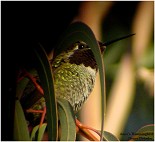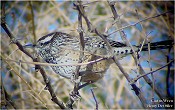DESCRIPTION
The Yuma Territorial Prison
opened for business in 1876. It ceased being used as a prison
in 1909 and is now an Arizona State Historical Park. The lawn and gardens north of the prison entrance
attract hummingbirds, Hooded Orioles, and Bronzed
Cowbirds. Of even more interest to birders, however, is
the small park at the base of the bluff, just south and east of
the prison itself. Large eucalyptus, mulberry, and other
trees attract migrants and permanent residents. The
creosote and cactus-studded bluff below the
prison cemetery harbor wrens, Verdins, and gnatcatchers.
Moving east to the other side of the park and the canal is a
large wetlands which, depending on the season, will have
waterfowl, waders, shorebirds, and rails. A levee road
borders both sides of the canal, and offers a great vantage
point for birding.As with most city parks, early
morning is the best time to visit.

Anna's Hummingbird in
Eucalyptus Tree
|
DRIVING
DIRECTIONS
Site #1 on Yuma
East Overview Map
Getting there from the intersection of
I-8 and 16th Str (the streetlight in front of McDonald's Restaurant) takes only a few minutes.
- From 16th Str, get on I-8
West (towards San Diego), go 1.3 miles and take Exit 1 (Giss Parkway)
- At the end of the exit ramp turn left on Giss Parkway and travel .2 miles
- Turn right onto entrance road for the Yuma Territorial Prison Historical State
Park and go
north .1 mile
- Proceed straight uphill to reach the parking lot for the prison itself
or...
- Turn right onto one of
several service roads to explore the levee canal or to reach the parking
area below the prison.
|
BIRDING
SUGGESTIONS
- numbered
spots correspond to the map on the right
1) Park
& lawn - Gila and Ladder-backed Woodpeckers are joined by
Northern
Flickers every winter. Bronzed Cowbirds are quite
noticeable in the spring. The big eucalyptus trees attract dozens of
Western Tanagers and Black-headed Grosbeaks in the spring, as
well as hordes of Anna's Hummingbirds. This is also a
prime spot for western warblers.
2) Mesquite
& palo verde trees - a trail winds through this
area, which is fast being overgrown. Look for Verdins,
gnatcatchers, Ladder-backed Woodpeckers, and kinglets.
3) Quail
bush, salt cedar, and mesquite flats - This area has Crissal
Thrasher, Blue Grosbeak, Swainson's & Hermit Thrushes in
winter, and migrants. Birding around the edges is usually
more productive than trying to crash through the brush.
4) Territorial
Prison yard - Hooded Orioles breed in the palm trees and the
Bronzed Cowbirds often parade on the lawn. 5) Lagoon
& wetlands - White-faced Ibis have roosted by the
hundreds here. If the water is low, this can be a great
spot for shorebirds. Winter brings all types of waterfowl,
including Hooded Merganser. Rails that are found in the
reeds include Sora and Clapper. Black Phoebes are very
common here and in winter are often joined by Vermilion
Flycatcher. Loggerhead Shrikes are often seen along the
north end of the Levee Road. 6) Railroad
bridge and the Colorado River - Cliff Swallows breed under
the bridge. Osprey, terns & waders may be seen
along the river. |

(Click
on the map for aerial photo)
|
Red numbers
correspond to
the birding suggestions on the left.
Blue areas are water (canals, rivers, ponds, marshes, etc.)
Green
dots are areas with trees. |
|
POSSIBLE
SIGHTINGS
-
unusual birds
highlighted in dark red
Expected
Migrants
(w = winters, too)
Warblers
- Wilson's Warbler
- Yellow Warbler
- Yellow-rumped Warbler (w)
- Orange-crowned Warbler (w)
- Black-throated Gray Warbler
- Hermit Warbler
- Townsend's Warbler
Flycatchers
- Western Kingbird (also breeds)
- Western Wood Pewee
- Western-type flycatchers
- Olive-sided Flycatcher
- Vermilion Flycatcher (w)
Other Passerines
- All the
western swallows (especially over the marsh)
- Swainson's & Hermit Thrushes
- Blue-gray Gnatcatcher
(w)
- Western Tanager (abundant in eucalyptus during spring migration)
- Lesser Goldfinch (in weeds along the levees)
- Bullock's Oriole (also breeds)
- Hooded Oriole (also breeds)
- White-crowned Sparrow (w)
Year-round
Residents
-Pied-billed
Grebe
-American Coot
-Virginia Rail
-Clapper Rail
-Sora
-Common Moorhen
-Greater Roadrunner
-Turkey Vulture
-Red-tailed Hawk
-Osprey
-Loggerhead Shrike
-Great-tailed Grackle
-Black Phoebe (very common)
-Crissal Thrasher
-Verdin
-Black-tailed Gnatcatcher
-Common Yellowthroat
- Bronzed Cowbird (probably breeds)
-Abert's Towhee
-Song Sparrow
|
TERRITORIAL
PRISON TRIP REPORTS
(Web Pages)
These trip write-ups give you some
idea of the birds that you can see at Fortuna Pond during the different
seasons.
Feb 27, 2000
Mar 23, 2000
Apr 28, 2000
May 9, 2000
Nov 27, 2000
Sep 30, 2001
Oct 7, 2001

Cactus Wren at the Prison
|
|